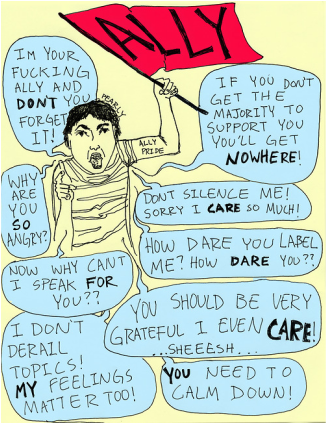 Allyship as a practice, not an identity Allyship as a practice, not an identity Tags: community, discourse/language, inequality, social mvmts/social change/resistance, ally, oppression, privilege, 00 to 05 mins Year: 2014 Length: 3:31 Access: YouTube Summary: In her article “Interrupting the Cycle of Oppression: The Role of Allies as Agents of Change,” Rev. Andrea Ayvazian defines an ally as “a member of a dominant group in our society who works to dismantle any form of oppression from which she or he receives the benefit.” In other words, an ally is someone who receives the benefits of systematic inequality but fights to eradicate those inequalities anyway. According to Ayvazian, allies can interrupt the cycle of oppression by using their voice to advocate for people who would otherwise be ignored or not listened to by the dominant group. This is why allies are important: they can evoke change in the places that oppressed groups are unable to reach. Such places include those where oppressed groups have been structurally marginalized, or places where oppressed voices simply go unheard. Ayvazian points to some of the difficulties involved in being an ally, and highlights how the role of an ally is often misunderstood. In this video, Franchesca “Chescaleigh” Ramsey proposes the following analogy to help viewers understand the role of an ally: “Imagine your friend is building a house, and they ask you to help. But you’ve never built a house before. So it’d probably be a good idea for you to put on some protective gear and listen to the person in charge, otherwise someone is going to get seriously hurt. It’s the exact same idea when it comes to being an ally…We need your help building this house, but you probably should listen, so you know what to do first.” Chescaleigh goes on to outline five tips for being a good ally, which include (1) understand your privilege, (2) listen and do your homework on the issues that are important to the communities you want to support, (3) speak up but not over the voices of the community members you want to support (and don’t take credit for things they’re already saying), (4) realize you’ll make mistakes and apologize when you do, and (5) remember that ally is a verb. Mia McKenzie, editor-in-chief of the activism blog Black Girl Dangerous, also suggests thinking of the term “ally” as a verb rather than label. McKenzie writes: “Ally cannot be a label that someone stamps onto you—or, god forbid, that you stamp on to yourself—so you can then go around claiming it as some kind of identity. It’s not an identity. It’s a practice. It’s an active thing that must be done over and over and over again, in the largest and smallest ways, every day.” Additional efforts to critical examine the term and role of an ally can be found here and here. Viewers can draw upon these various resources when thinking about the concept of an ally and privileged people’s roles in movements for social equality and change. For a recent and applied example of how to be an ally, read Spectra’s article, “Dear White Allies: Stop Unfriending Other White People Over Ferguson.” Submitted By: Abigail Adelsheim-Marshall, Blythe Baird, and Valerie Chepp
3 Comments
Manuel Franco
7/29/2023 01:43:50 am
I just want to say Thank You to everyone who supported me through the years. My name is Manuel Franco, New Berlin, Wisconsin. My story of how I won the Powerball lottery of $768.4M is a bit of a tale. I have been playing Powerball tickets for 6 years now since I turned 18. I bought my first ticket on my 18 birthday. I was feeling very lucky that day because I had contacted Dr. Odunga Michael to help me with the winning Powerball numbers. I really had that great great feeling that I looked at the camera wanting to wink at it. I only did a tiny part of it and trusted him. He gave me the numbers after I played a couple other tickets along with it for $10. I checked my ticket after the winnings came online and saw the numbers were correct including the Power play. I screamed for about 10 minutes because it felt like a dream. I had won $768.4M. You can check my winning testimony with the lottery officials just with my name search. Thank you Dr Odunga. Well, his email is [email protected] and you can also call or Whats-app him at +2348167159012 so you guys can contact him
Reply
mark hold
7/7/2024 02:01:48 pm
One faithful day as i was watching a video on you tube i saw a comment of one MR PAUL HAVERSACK testifying of this great herbal healer doctor Moses Buba,That helped him enlarge his manhood .i was shocked and happy, so i quickly visited his website and emailed him within 30 mins he got back to me and told me all i need to buy and i did so after 4 days i received his herbal medicine ,he gave me instructions on how to use it ,as i am speaking to you people now after using the cream for just two weeks my manhood size is 10 inches long and 8.0 girth ,,am so happy and grateful for his work in my life thank you so much Doctor Moses buba ,,i also learnt he has cure for LOW SPERM COUNT,PREMATURE EJACULATION,ERECTILE DYSFUNCTION,HIV/AIDS VIRUS,DIABETES 1/2,HERPES DISEASE,CANCER,and lots more
Reply
Leave a Reply. |
Tags
All
.
Got any videos?
Are you finding useful videos for your classes? Do you have good videos you use in your own classes? Please consider submitting your videos here and helping us build our database!
|
 RSS Feed
RSS Feed
